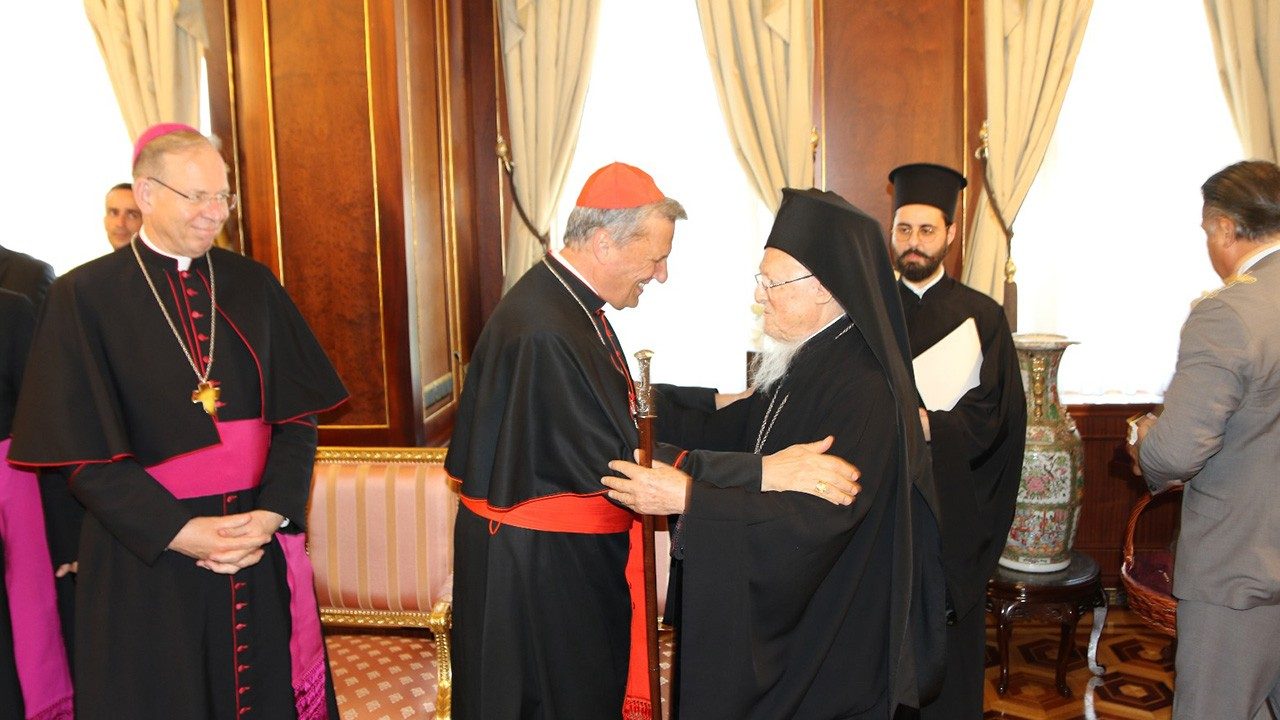
A fraternal meeting—marked by an embrace reminiscent of those often exchanged with Pope Francis—took place on the afternoon of June 17 at the Phanar between Ecumenical Patriarch of Constantinople Bartholomew I and Cardinal Mario Grech, Secretary General of the Synod, who is currently in Istanbul for the meeting of the General Secretaries of the Bishops’ Conferences of Europe (CCEE).
During the gathering, Cardinal Grech presented to all participants the process accompanying the implementation phase of the Synod. His itinerary also included a stop in Nicaea, present-day Iznik—the site of the First Ecumenical Council, whose 1700th anniversary is approaching, and where a visit by Pope Leo XIV is anticipated, continuing the intention of his predecessor, Francis.
Remembering Pope Francis
In his address to the participants of the CCEE meeting, Patriarch Bartholomew recalled Pope Francis and expressed his “great anticipation” for a possible visit by Pope Leo XIV. First, the Patriarch conveyed his gratitude “for the personal friendship and the unwavering commitment of Pope Francis” (whom he described as “a true friend of Orthodoxy”), noting that his pontificate “has been a time of warmth and mutual encouragement.”
He then expressed joy at the election of his successor, Robert Francis Prevost, whom he has already met twice. “We are confident,” the Patriarch said, “that under his leadership, the ties between our two Churches will continue to deepen in truth and love. We pray that his pontificate will be marked by spiritual discernment and prophetic courage, as the Church continues to bear witness in a world longing for direction and unity.”
The importance of dialogue
Patriarch Bartholomew dedicated significant attention to the theme of dialogue—ecumenical and interreligious—especially in “a time marked by divisions, fear and violence” when “we are called to be builder of bridges, not walls.” In particular, he underlined the importance of the relationship with the Roman Catholic Church, and the theological dialogue that resumed nearly half a century ago following the revocation of mutual anathemas in 1965.
This relationship is essential to pursue “a steady and serious path of encounter”—a journey that, while not without challenges, is also “marked by moments of grace, deepening understanding, and a sincere desire for the unity that Christ wills.”
Peace at the core
The Patriarch also emphasized dialogue with the other ancient Eastern Churches, Protestant traditions, and numerous inter-Christian bodies. These, he noted, are not “formal processes,” but rather “spiritual encounters,” and opportunities for “renewed commitment to the Gospel.”
As Orthodox Church, he added, “we likewise place great importance on interfaith dialogue,” explaining that relations with Jewish, Muslim, and other religious leaders have long been cultivated in the conviction that “peace, mutual understanding, and respect for the dignity of every human being must be core commitments for all faith traditions.”
Challenges for the Church and humanity
“Of course, we are not blind to the many challenges facing the Church and humanity today. Questions of social justice, migration, war, religious persecution, and the climate crisis all demand our attention,” Patriarch Bartholomew said. These pressing concerns are “inseparable from the Gospel that we proclaim.” Care for creation, in particular, remains “an area in which our collaboration with other Churches and institutions has borne much fruit.”
The service of the Episcopal Conferences of Europe
In this context, the Ecumenical Patriarch praised and encouraged the service of the Episcopal Conferences of Europe, which help to “articulate the Church’s witness and coordinate her response to the needs of the people.” “You make possible the coherence, clarity, and charity with which the Church speaks today,” he noted. He also referred to the upcoming celebrations marking the 1700th anniversary of the Council of Nicaea—a timely “reminder that unity is not a matter of convenience or strategy, but of fidelity to the truth revealed in Christ and proclaimed through the life of the Church.”
The Mass celebrated by Cardinal Grech
The theme of Nicaea was central as well to the homily delivered by Cardinal Grech during the Mass celebrated in the crypt of the Church of Saint Anthony of Padua in Istanbul. “We are united here in this place where, 1700 years ago, the Church solemnly proclaimed that the Son is of the same nature as the Father,” the Cardinal said.
At that time, “for many, this was a scandalous choice of terms and an insult to God’s nature,” yet in truth, “it demonstrates the greatness and theological courage” of those present at the Council: “They were arguing that God’s nature, though one, is participatory. The Son participates in the nature of the Father.”
“Jesus calls us sons of God, and a son participates in the same nature as the parents,” Grech continued. “In the case of us human beings, God takes the initiative and offers us a share in his nature—he adopts us. And seen from our standpoint, we can participate in God’s nature by imitation, by acting and behaving in the way the Father behaves, by being like the Father.”
Living communion in a synodal way
“Imitating God means entering into communion with others, building bridges of communion between different people, as difficult as this may be,” noted Cardinal Grech.
He also cited paragraph 154 of the Final Document of the Synod of Bishops: “Living through the synodal process, we have renewed our awareness that the salvation to be received and proclaimed is inherently relational… The Spirit has placed the desire for authentic relationships and true bonds in the heart of every human being… We can live the communion that saves by walking in a synodal way, in the intertwining of our vocations, charisms and ministries, by going forth to meet everyone in order to bring the joy of the Gospel.”
In conclusion, Grech acknowledged, “building bridges of communion is never easy.” He recalled how Nicaea itself was marked by tensions, just as the recent Synod on Synodality sparked debates and controversies. “But we have to keep in mind that we are mere finite creatures, trying to imitate what is infinite, God’s nature.”
Source: vaticannews.va





